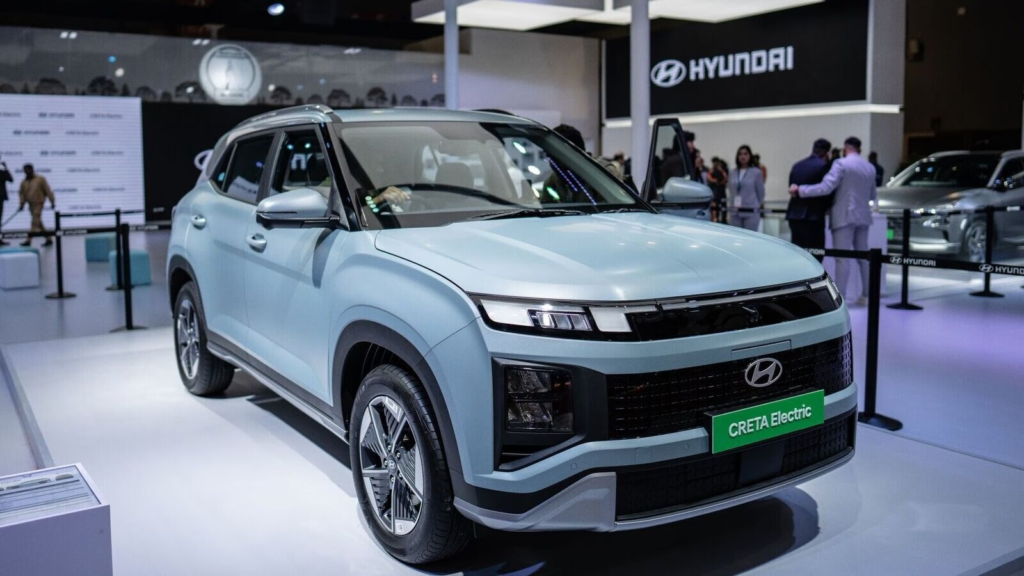Hyundai Motor India Ltd is preparing to introduce hybrid electric vehicles over the next few years, seeking to include more clean-fuel cars in its overall portfolio.
India’s second-largest passenger vehicle manufacturer had just a 1% contribution from electric vehicles in its overall product mix in 2024-25. Hybrid cars have both gasoline-powered engines and electric motors.
At a post-earnings media briefing on Friday, Hyundai Motor India’s management refrained from setting a specific target for increasing the number of clean fuel cars in the company’s overall product portfolio. However, the company expects to exceed the domestic industry’s average for hybrid electric vehicles by 2029-30, they said.
Hyundai Motor India, a subsidiary of South Korean automotive giant Hyundai Motor Co., plans to launch 26 vehicle models in India by 2030—20 of which will be powered by conventional internal combustion engines (ICE), while the other six will be electric vehicles. This product pipeline doesn’t include Hyundai Motor India’s plan to launch hybrid vehicles.
When it does introduce hybrid vehicles in India, the company will join Maruti Suzuki India Ltd, the country’s largest carmaker, in having a comprehensive portfolio comprising ICE, hybrid, and pure electric vehicles.
“We feel that in India all kinds of technologies have a space. One solution cannot work and we need to leverage all kinds of technologies to reach the carbon neutrality goal,” Tarun Garg, chief operating officer at Hyundai Motor India, said at the media briefing.
Tepid FY26 outlook
Hyundai Motor India’s total revenue in 2024-25 declined 1% to ₹69,192 crore as overall domestic sales fell 3% to 598,666 passenger vehicles. Profit slumped 6.9% to ₹5,640 crore, with the company’s management blaming weak consumer demand in the previous financial year.
Also, hurt by rising raw material costs, the carmaker’s FY25 margin on earnings before interest, taxes, depreciation and amortization—or EBITDA, a measure of operational efficiency—declined by 20 basis points to 12.9%.
However, for the final quarter of FY25 (January-March 2025), Hyundai Motor India reported a 1.1% year-on-year increase in revenue to ₹17,940 crore, although profit fell 3.7% to ₹1,614 crore.
“While we expect our FY26 domestic growth to be broadly in line with Industry estimates of low-single digit, we are aiming for 7-8% volume growth in exports,” Unsoo Kim, managing director at Hyundai Motor India, said.
The company faces stiff challenge from homegrown auto giants Mahindra and Mahindra Ltd and Tata Motors Ltd for the second place in the domestic auto sector. Tata Motors sales declined by 0.7% to reach 535,960 cars in FY25. Mahindra recorded a surge of 20% in sales to 512,626.
The case for hybrid
Hyundai Motor India is hoping to see continued growth in its electric vehicle segment this financial year. Following the launch of its Creta electric vehicle in January, Hyundai Motor India’s total EV sales reached 3,969 units in FY25, a growth of 87%.
Hyundai Motor Co. already has some hybrid models in global markets, including SantaFE Hybrid, TUCSON Hybrid, and Kona Hybrid.
The auto industry is divided on the issue of hybrids and pure electric vehicles.
Earlier, Tata Motors Ltd, Mahindra and Mahindra Ltd, and Hyundai were seen in the pure EV camp while Maruti Suzuki and Toyota Kirloskar occupied the hybrid camp.
Pure electric vehicles in India attract a goods and service tax of 5%, much lower than the 28% GST for other car models.
The Delhi government’s draft electric vehicle policy shared with EV makers in April for comments suggests that hybrid cars be given waivers similar to that for electric vehicles in terms of road tax and registration fees.
According to Deloitte’s latest global automotive consumer study, only 8% of Indian consumers were interested in pure electric vehicles, while 33% of the study’s respondents preferred hybrid car variants.
Hyundai Motor India’s share price rose 0.2% to ₹1,839.70 apiece on NSE on Friday, while the Nifty Auto index gained 0.62%.

